
|

Laws of the Twelve
Tables
450 BC In the early republican period, matters between private
individuals were settled by customary law rather than by leges.
In the framework of the social struggle, the growing complaints of
plebeians at the arbitrary application of the unwritten law by the ruling elite
of patricians lead to the formulation of Laws of the Twelve
Tables.
This codification was
preceded by direct
contacts with the Greek world (including Greek colonies in Southern Italy),
where there were already important models such as the
codification by Solon (640 – 560
BC).
" Solon was commissioned to draw a new code of
laws in order to solve a civil crisis threatening the fabric of Athens as a
city-state." - Kelcy Sagstetter
A rising tide of class warfare had
reached a critical point because wealthy landowners had enslaved or
impoverished most of the poor farmers.
Solon canceled all debt and
ended the wide-spread practice of
debt-slavery.
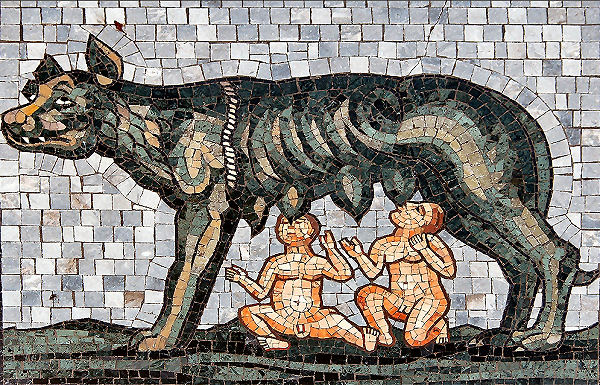
In ancient Roman society their
is a relation between patronus ("patron") and
cliens ("client").
Patricians, or upper-class Romans,
were patrons to
plebian cliens.
The patrons provided many
types of support to their cliens who, in turn,
rendered services and loyalty to
their patrons.
The number of
clients and sometimes
the status of clients
conferred prestige on the
patron.
The
patron is the protector, sponsor, and benefactor of the client; the
technical term for this protection
was patrocinium.
Benefits
a patron might confer include
legal representation in court, loans of money,
influencing business deals
or marriages, and supporting
a client's candidacy for political office or
a priesthood.
In Rome a clien was a free man
who entrusted himself to another and received protection in
return.
This
ancient oath of fealty carries through into the current age and can be seen
being exercised by presidential cronies.
Clientship was a hereditary social status
consecrated by usage and
recognized, though not defined or enforced, by the law.
Cliens were expected to offer
their services to their
patron as needed.
A freedman became
the clien of his former master.
A patronage relationship might also
exist between a general and
his soldiers, a founder and colonists, and
a conqueror and
a dependent foreign
colony.
'CLIENS' contains the same element as the verb cluere,
to "hear" or "obey," and to
Niebuhr equivalent with the German word hoeriger, "a dependent."
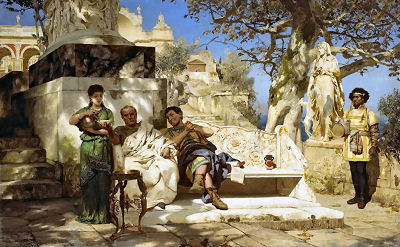
"In the time of Cicero, we
find patronus in the sense of adviser, advocate, or defender, opposed to cliens
in the sense of the person defended, or the consultor; and this use of the word
must be referred, as we shall see, to the original character of the patronus.
The relation of a master to his liberated slave (libertus) was also
expressed by the word patronus, and the libertus was the cliens of his
patronus.
Any Roman citizen who wanted a protector, might attach
himself to a patronus, and would thenceforward be a cliens.
Strangers
who came into exilium at Rome might do the same (jus applicationis).
Distinguished Romans were also sometimes the patroni of states and
cities, which were in a certain relation of subjection or friendship to Rome;
and in this respect they may be compared to colonial agents, or persons among
us, who are employed to look after the interests of the colony in the mother
country; except that among the Romans such services were never remunerated
directly, though there might be an indirect remuneration.
This
relationship between patronus and cliens was expressed by the word Clientela,
which also expressed the whole body of a man's clients." - George Long, Fellow
of Trinity College: A Dictionary of Greek and Roman Antiquities,
published John Murray, London, 1875

Table I. Proceedings Preliminary to Trial
1. If the plaintiff summons the
defendant to court the defendant shall go.
If the defendant does not go
the plaintiff shall call a witness thereto.
Only then the plaintiff
shall seize the defendant.
2. If the defendant attempts evasion or
takes flight the plaintiff shall lay hand on him.
3. If sickness or age
is an impediment he who summons the defendant to court shall grant him a
vehicle. If he a does not wish he shall not spread a carriage with cushions.
4. For a freeholder' a freeholder shall be surety; for a proletary
anyone who wishes shall be surety.
5. There shall be the same right of
bond and of conveyance with the Roman people for a steadfast person and for a
person restored to allegiance.
6. When the parties agree on the matter
the magistrate shall announce it.
7. If they agree not on terms the
parties shall state their case before the assembly in the meeting place or
before the magistrate in the market place before noon. Both parties being
present shall plead the case throughout together.
8. If one of the
parties does not appear the magistrate shall adjudge the case,
afternoon, in favor of the
one present.
9. If both parties are present sunset shall be the time
limit of the proceedings.
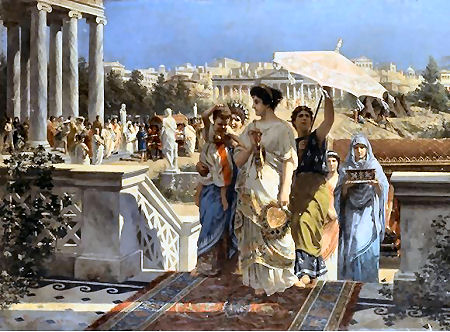
Table II. Trial 1a. The
penal sum in an action shall be either 500 assēs or 50 assēs.
It shall be argued by solemn deposit with 500 assēs, when the
property is valued at 1,000 asses or more, but with 50 asses, when the property
is valued at less than 1,000 assēs.
If the controversy is about
the freedom of a person the case shall be argued by a deposit of 50 assēs.
1b. An action by demand for a judex concerning that which is
claimed in accordance with a stipulation concerning division of an inheritance
among joint heirs.
2. If circumstances are an
impediment for the judex or for the
arbiter or for either litigant,
on that account the day of trial shall be postponed.
3. Whoever needs
evidence shall go every third day to
shout before the doorway.
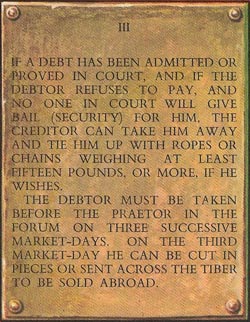
Table III. Execution of Judgment
1. Thirty days shall be allowed by law for payment of
confessed debt and for settlement of matters
adjudged in court.
2. After this time the creditor shall have
the right of laying hand
on the debtor.
3. Unless the debtor discharges the debt adjudged
or unless someone offers surety for him in court the
creditor shall take the debtor and
bind him either with a thong or with fetters.
4. If the debtor
wishes he shall live on his own means.
If he does not live on his own
means the creditor who holds him in bonds
shall give him a pound
of grits daily.
5. They shall have the
right to compromise, and unless they compromise
the debtor shall be held in
bond for sixty days.
They shall be
brought to the praetor into the meeting place on three successive market days,
and the amount for which they have
been judged liable shall be declared publicly.
On the third market
day they shall suffer capital punishment or
shall be delivered for sale abroad across
the Tiber River.
6. On the third market day the creditors shall cut
shares.
If they have cut more or
less than their shares it shall be without prejudice.
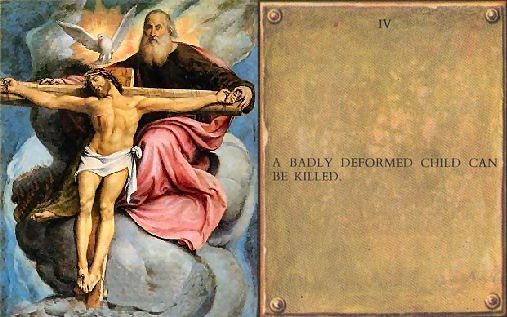
1.
A notably
deformed child shall be killed immediately.
2a.
To a father shall be given over a
son the power of life and death.
2b. If a father
thrice surrenders a son for sale the son
shall be free from the father.
3.
To repudiate his wife her husband shall take
her property, take the keys and expel her.
4. A child born within
ten months of the father's death shall enter into the inheritance.

Table V. Inheritance and Guardianship
1. Women,
even of full age, because of their levity of mind shall be under
guardianship except vestal virgins, who shall be free from
guardianship.
2. The conveyable
possessions of a woman under
guardianship of male authority shall not be acquired by
prescriptive right unless
transferred by herself with the authorization of her guardian.
3. According as a person has
made bequest regarding his personal property or the guardianship of his estate
so shall be the law.
4. If anyone who
has no direct heir dies nearest male authority shall have the
estate.
5. If there is not a familial authority
the male clansmen shall have
the estate.
6. Persons for whom by will a guardian is not given,
their male authority shall be
guardians.
If a
person is insane authority over him and his personal property shall belong to
familial authority and in default of these to his male clansmen.
7. A
spendthrift,
forbidden from administering his own goods, shall be under
guardianship of his familial
authority.
8. If a Roman citizen freed man dies intestate without a
direct heir, to his patron shall fall the inheritance.
9. Debts of the
estate shall be divided among the heirs proportional to the share of
inheritance.
10. Action for division of an estate shall be available for
joint heirs wishing to withdraw.
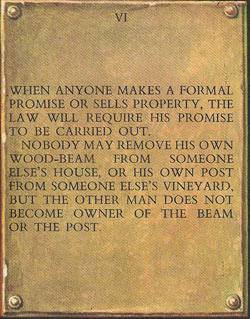
1.
When a person makes bond and
conveyance, his verbal contract is a pledge enforced by law.
2. It
shall be sufficient to make good faults confessed by tongue, for those flaws
denied expressly when questioned about them vendor shall undergo a penalty of
double damages.
3. Warranty of
prescriptive right in land shall be two years to acquire ownership.
Of
all other things, prescriptive right shall be for one year to acquire
ownership.
4.
Against an alien a warranty
of ownership or prescriptive right shall be valid forever.
5. If
any woman is unwilling to be subjected to husband's marital control she shall
absent herself for three successive nights in every year and by this means
shall interrupt his prescriptive
right.
6a. If the parties join their hands on the disputed property
when pleading in court both conveyance and surrender in court shall be
confirmed.
7. Interim possession shall be granted in favor of liberty.
8. One shall not take from
framework timber fixed in
buildings or in vineyard.
One who is convicted of having torn down
framework double damages shall be given.
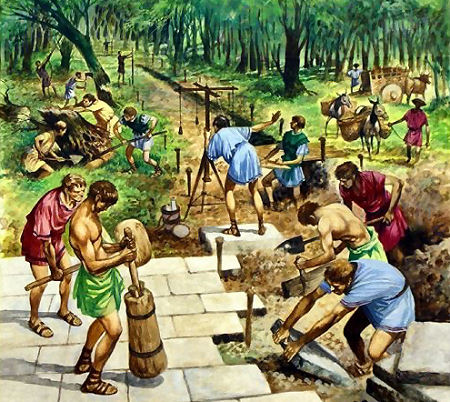
Table VII. Real Property 1.
Clearance shall be two and one-half feet in an action for regulating
boundaries.
4. In ownership through prescriptive right three arbiters
shall regulate boundaries.
6. The width of a road shall be eight feet
on a straight stretch, on a bend sixteen feet.
7. They shall build and
repair the road and keep it free from stones so one shall drive one's beast or
carriage where one wishes.
8b. If a watercourse conducted through a
public place does damage to a private person the said person shall have the
right to bring an action.
9a. Branches of a tree shall be pruned all
around to a height of fifteen feet.
9b.
If a tree from a neighbor
has been felled by the wind it belongs to the land.
10. It shall
be lawful to gather fruit falling upon another's farm.
11. Articles
sold and undelivered are not owned by the purchaser unless he pays the price or
tenders a surety or a pledge.
12. A slave is ordered in a will to be a free man
under this condition: "If he has given 10,000 assēs to the heir"; although
the slave has been alienated
by the heir, yet the slave by giving the said money to the buyer shall
enter into his freedom.
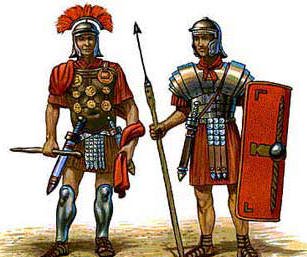
Table VIII. Torts or Delicts 1. Whoever enchants by
singing an evil incantation that can cause dishonor or disgrace to another
shall suffer a capital penalty.
2. If anyone has broken another's
limb there shall be compensation in kind with him.
3. If a person
breaks a bone of a freeman with hand or by club, he shall undergo a penalty of
300 assēs; or of 150 assēs, if of a slave.
4. If one commits
an outrage against another the penalty shall be twenty-five assēs.
5. ... One has broken
... One shall make
amends.
6. If a quadruped caused damage
an action either for surrendering replacment that which was damage to the
aggrieved person or for offering an assessment of the damage.
7. If
fruit from your tree falls onto my farm I may feed my flock.
9. If
anyone pastures on or cuts by night another's crops obtained by cultivation the
penalty for an adult shall be capital punishment.
A person below the
age of puberty at the praetor's decision shall be scourged and shall be judged
as a person either to be surrendered to the plaintiff for damage done or to pay
double damages.
10. Whoever destroys by
burning a building or a stack of grain placed beside a house, shall be bound,
scourged, burned to death,
provided that knowingly he committed this crime;
if by negligence,
either he shall repair the damage or if he is unable he shall be corporally
punished.
11. Whoever fells unjustly another's trees shall pay
twenty-five assēs for each tree.
12. If a
thief commits a theft by
night,
if the owner kills the
thief, the thief shall be killed
lawfully.
13. By daylight if a
thief
defends himself with a weapon the
owner shall shout before acting.
14.
Thieves caught in the act
shall be scourged and adjudged as bondsmen to the person against whom the
theft has been committed provided that they have done this by daylight and have
not defended themselves with a weapon; slaves caught in the act of theft, shall
be whipped with
scourges and shall be thrown from the Tarpeian Rock;
children below the age of puberty
shall be scourged at the praetor's decision and the damage done by them shall
be repaired.
15. The penalty for detected planted theft shall be triple
damages.
16. If a person prosecutes for theft which is not of the type
wherein the thief is caught
in the act the thief shall settle the loss by paying double damages.
17.
Title to a stolen article
shall not be acquired by prescriptive right.
18a. No person shall practice
usury at a rate of more than one twelfths.
18b. A thief shall be
condemned for double damages and a
usurer for quadruple damages.
19. From a lawsuit about an article
deposited, an action for double damages shall be given.
20.
If guardians steal a ward's
property there shall be
an action against a
guardian for double damages;
each guardian shall be held for
the entire sum.
21.
If a patron defrauds a
client he shall be accursed.
(The accursed became forfeit to
the god(s). Anyone who killed him
was considered to be performing a sacred duty and enjoyed impunity.)
22. Unless he speaks his testimony whoever allows himself to be called
as a witness or is a scales-bearer shall be dishonored and incompetent to give
or obtain testimony.
(Anyone unable to defend themsleves,without a
Patron, was remanded to the slave master
for sale by the State as a slave to the highest bidder.)
23. Whoever is convicted of speaking
false witness shall be flung from
the Tarpeian Rock.
24a. If a weapon has sped
accidentally from one's hand, rather than if one has aimed and hurled it, to
atone for the deed a ram is substituted as a peace offering to prevent blood
revenge.
24b. If anyone pastures on or cuts stealthily by night
another's crops the penalty shall be capital punishment, and,
after having been hung
up, death as a sacrifice to Ceres.
25. ...
for administering a
drug.
26.
No person shall hold
nocturnal meetings in the city.
27.
Guild members shall
have the power to make for themselves any rule that they may wish provided that
they impair no part of the public law.
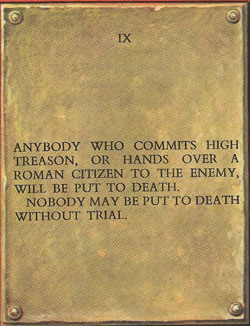
Table IX. Public Law 1.
Laws of personal exception shall not be
proposed.
2. Laws concerning capital punishment of a citizen shall
not be passed except by the Great Assembly.
3.
A judex or an
arbiter legally appointed who has been convicted of receiving money for
declaring a decision shall be punished capitally.
4. ... the
investigators of murder ... who have charge ...
5.
Whoever incites a public
enemy or whoever
betrays a citizen shall be punished capitally.
6.
For anyone
whomsoever to be put to death without a trial and unconvicted is
forbidden.
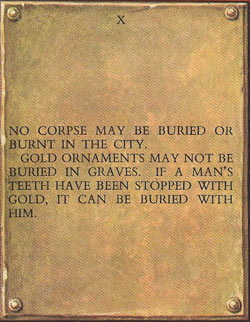
Table X. Sacred Law1. A
dead person shall not be buried or burned in the city.
2.
One shall not smooth a funeral pyre
with a shovel.
3. Expenses of a funeral shall be
limited to three mourners wearing veils and one mourner wearing an inexpensive
purple tunic and ten flutists.
4.
Women shall not tear their cheeks
or shall not make a sorrowful outcry on account of a funeral.
5a. A
dead person's bones shall not be collected that one may make
a second funeral.
5b. An
exception is for death in battle and on foreign soil.
6a. Anointing by
slaves is abolished and every kind of drinking bout there shall be no costly
sprinkling, no long garlands, no incense boxes.
6b. A myrrh-spiced
drink shall not be poured on a dead person.
7. Whoever wins a crown
himself or by his property, by honor, or by valor, the crown is bestowed on him
at his burial.
8. No gold shall be added to a corpse.
If any
one buries or burns a corpse that has gold dental work it shall be without
prejudice.
9. It is forbidden to build a burning mound nearer than
sixty feet to another building.
10. It is forbidden to acquire by
prescriptive right of a sepulcher or a burning mound.
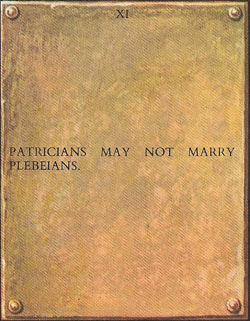
Table XI. Supplementary Laws 1. There shall not be intermarriage between plebeians and
patricians.
2. regulations concerning insertion
3. regulations
concerning days permissible for official legal action.
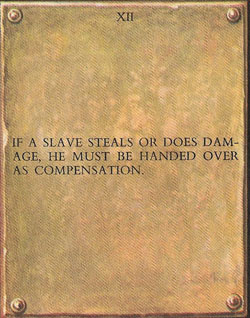
Table XII. Supplementary Laws 1. There shall be introduced
a seizure of pledge against a person
who buys an animal for
sacrifice and does not pay
the sacrifice price.
2. If
a slave commits a theft or
does damage to property the master will either undergo assessment of the claim
or deliver the delinquent for compensation.
3. If one has obtained an
unjustifiable grant of interim possession the magistrate shall grant three
arbiters; the unjustifiable holder of interim possession shall settle the
plaintiff's loss of enjoyment by paying double damages.
4. It is
forbidden to dedicate for consecrated use a thing whose ownership is in
controversy; otherwise a penalty of double the value involved shall be
suffered.
5. Whatever
the people last ordain shall be legally valid.

The jurists, who were
usually patricians, began to record their legal decisions in writing, thus
giving rise to a special legal literature, which became more and more
differentiated over the course of
time.
The work of the jurist Sextus Aelius on the Law of the Twelve
Tables, the Tripertita, was the first written record of the
interpretative activity of the jurists (interpretatio prudentium), deposited
above all in the responsa (legal opinions), and became an independent
source of law.
The auctoritas
(reputation/dignity/authority) of the individual jurist lent assertiveness to
his opinions, but many questions remained controversial.
Thus there
came about the special character of Roman law as a ius controversum
(controversial law) which, on the one hand, could not be tied down to clear
rules, but on the other was not speculative.
Instead, the focus was
always on the concrete case, and the decision, once arrived at, could be
applied per analogiam (by
analogy) to similar cases. |
|

 |
This web site is not a commercial web site and
is presented for educational purposes only.

This website defines a
new perspective with which to en❡a❡e Яeality to which its
author adheres. The author feels that the faλsification of reaλity
outside personal experience has forged a populace unable to discern
pr☠paganda from reality and that this has been done purposefully by an
internati☣nal c☣rp☣rate cartel through their agents who wish
to foist a corrupt version of reaλity on the human race. Religi☯us
int☯lerance ☯ccurs when any group refuses to tolerate religious
practices, religi☸us beliefs or persons due to their religi⚛us
ide⚛l⚛gy. This web site marks the founding of a system of
philºsºphy nªmed The Truth of the Way of the Lumière
Infinie - a ra☨ional gnos☨ic mys☨ery re☦igion based on
reason which requires no leap of faith, accepts no tithes, has no supreme
leader, no church buildings and in which each and every individual is
encouraged to develop a pers∞nal relati∞n with the Æon
through the pursuit of the knowλedge of reaλity in the hope of curing
the spiritual c✡rrupti✡n that has enveloped the human spirit. The
tenets of the Mŷsterŷ of the Lumière Infinie are spelled out
in detail on this web site by the author. Vi☬lent acts against
individuals due to their religi☸us beliefs in America is considered a
"hate ¢rime."
This web site in no way c☬nd☬nes
vi☬lence. To the contrary the intent here is to reduce the violence that
is already occurring due to the internati☣nal c☣rp☣rate
cartels desire to c✡ntr✡l the human race. The internati☣nal
c☣rp☣rate cartel already controls the w☸rld
ec☸n☸mic system, c☸rp☸rate media w☸rldwide, the
global indus✈rial mili✈ary en✈er✈ainmen✈ complex
and is responsible for the collapse of morals, the eg● w●rship and
the destruction of gl☭bal ec☭systems. Civilization is based on
coöperation. Coöperation with bi☣hazards of a
gun.
American social mores and values have declined precipitously over
the last century as the corrupt international cartel has garnered more and more
power. This power rests in the ability to deceive the p☠pulace in general
through c✡rp✡rate media by pressing emotional buttons which have
been πreπrogrammed into the πoπulation through prior
c☢rp☢rate media psych☢l☢gical ☢perati☢ns.
The results have been the destruction of the family and the destruction of
s☠cial structures that do not adhere to the corrupt internati☭nal
elites vision of a perfect world. Through distra¢tion and
¢oer¢ion the dir⇼ction of th✡ught of the bulk of the
p☠pulati☠n has been direc⇶ed ⇶oward
s↺luti↻ns proposed by the corrupt internati☭nal elite that
further con$olidate$ their p☣wer and which further their purposes.
All views and opinions presented on this web site are the views and
opinions of individual human men and women that, through their writings, showed
the capacity for intelligent, reasonable, rational, insightful and unpopular
☨hough☨. All factual information presented on this web site is
believed to be true and accurate and is presented as originally presented in
print media which may or may not have originally presented the facts
truthfully. Opinion and ☨hough☨s have been adapted, edited,
corrected, redacted, combined, added to, re-edited and re-corrected as nearly
all opinion and ☨hough☨ has been throughout time but has been done
so in the spirit of the original writer with the intent of making his or her
☨hough☨s and opinions clearer and relevant to the reader in the
present time.
Fair Use Notice

This site may contain
copyrighted material the use of which has not always been specifically
authorized by the copyright owner. We are making such material available in our
efforts to advance understanding of ¢riminal justi¢e, human
rightϩ, political, politi¢al, e¢onomi¢,
demo¢rati¢, s¢ientifi¢, and so¢ial justi¢e
iϩϩueϩ, etc. We believe this constitutes a 'fair use' of any
such copyrighted material as provided for in section 107 of the US Copyright
Law. In accordance with Title 17 U.S.C. Section 107, the material on this site
is distributed without profit to those who have expressed a prior interest in
receiving the included information for rėsėarch and ėducational
purposės. For more information see:
www.law.cornell.edu/uscode/17/107.shtml. If you wish to use copyrighted
material from this site for purposes of your own that go beyond 'fair use', you
must obtain permission from the copyright owner. |
 Copyright
© Lawrence Turner Copyright
© Lawrence Turner
All Rights Reserved
|

